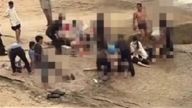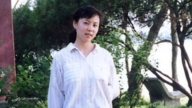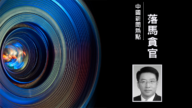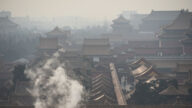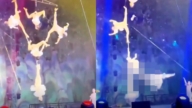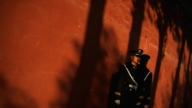【新唐人2011年6月10日讯】最近2、3个月来,中共中央机关报《人民日报》频繁变调,立场忽左忽右,引起外界关注。海内外学者都认为,这反映了中共十八大前党内高层分裂加剧、斗争激化。近期,前国家新闻出版总署署长杜导正透露,中共总理温家宝的政治改革主张,在中南海权力核心遭到孤立。
从4月份开始,《人民日报》连续发表多篇评论:包括《以包容心态对待“异质思维”》、《用公平正义消解“弱势心态”》、《希望杜绝一切非理性言行是不现实的》、《执政者要在众声喧哗中倾听“沉没的声音”》、《知错即改远比一贯正确更可信可敬》等等。
此外,《人民日报》就“徐武事件”发表评论,批评把上访的人随便关到精神病院是非法的﹔还发表文章,对深圳市禁止民工在大学生运动会期间讨薪上访,提出批评﹔并以平衡报导的方式,采访了沈阳刺死城管的小贩妻子张晶。
《人民日报》的评论《以包容心态对待“异质思维”》,甚至引用了法国哲学家伏尔泰的名言:“我不同意你的看法,但我誓死捍卫你说话的权利。”
5月30号,《人民日报》前副总编辑周瑞金,接受香港媒体采访时表示,这些系列评论是在告诫执政者:放开言论、倾听民众的批评、关注弱势群体。他认为,代表中央的主流媒体发出这样的声音,有不一样的意义。
陈破空(前美国哥伦比亚大学访问学者):【录音】“我觉得这里有两种可能性,第一种就是,中共党内、中共高层的斗争激烈化的一个表现,实际上是它高层在互相告诫。另外一个可能性就是,因为每一次中共开代表大会之前,都会放一些民主的空气球。” 【声音来源:希望之声电台】
香港《动向》杂志5月号发表独立作家朱学渊的文章指出,中国人的政治斗争是三元混战:有人主张走毛泽东的共产老路,有人主张走孔子的传统专制,还有人主张走全盘西化的民主宪政。
朱学渊认为,中国社会有这三种思潮,共产党中央就一定也分三派。第一派是“唱红打黑”的重庆市委书记薄熙来,第二派是“尊孔”的胡锦涛、吴邦国,第三派是强调“政治改革”的温家宝为代表。
曹思源(北京思源社会科学研究中心主任):【录音】“不搞政治体制改革,极左的东西它就必然要回潮。文化大革命十年的浩劫之所以能在中国发生,就充分说明我们的体制不合适。像这样的灾难并没有获得制度上的保障使它不再发生。”【声音来源:德国之声】
6月5号,现任《炎黄春秋》杂志社社长杜导正接受香港《明报》专访时透露,温家宝总理去年多次发出政改呼声,但在9月中南海一场有关政改的辩论中,“左派集体压过来,温总迅速被孤立。”
《动向》杂志披露,温家宝遭到贺国强、李长春、刘云山、张德江等人围攻。杜导正说,在去年那种情况下,国家主席胡锦涛并未对温总改变态度。他评价胡“既宽容左的又宽容右的”。据他了解,一些温总的支持者也不敢直言支持。
5月25号,《人民日报》发表署名文章《坚决维护党的政治纪律》,禁止党员发表同中央相违背的言论,并说这是“一场严肃的政治斗争”。
朱健国(深圳独立学者):【录音】“这条信息显示加强党的政治纪律在党内遇到了很大的阻力,归毛派它在党内已经占上风了。执政的政权的稳定都出现了危机,这一点他们是共同的。但是如何解决这个危机也就在党内高层可能出现了严重的分裂。”【声音来源:自由亚洲电台】
杜导正认为,这篇文章矛头是针对温家宝的。他说,虽然温家宝的政改思维在中南海属于少数,但获得包括杜本人在内的老干部们拥护。
杜导正认为,中国未来的政治改革,“自上而下基本不可能实现”。在他看来,应以自下而上为主体,推动上层与下层结合,这是改革最佳路线。“代价小,多数人都可以接受,但需时间。”
新唐人记者 李元翰 肖颜 综合报导
“Triple Melee” At CCP’s Top
CCP (Chinese Communist Party) Central Committee
mouthpiece, People’s Daily, lately changes tone
and standpoints often. Overseas scholars believe
this reflects the high-level CCP splitting ambience
before the 18th National People’s Congress.
Du Daozheng, former National Director of Press
and Publication, thinks Premiere Wen Jiabao’s
political reform was deliberately isolated.
People’s Daily published a series of commentaries
since April, “Be Tolerant To Different Thoughts”,
“Remove Weak Mentality With Fairness And Justice”
“It’s Unrealistic To Eliminate All Irrational Words
and Deeds”, “Rulers Should Listen
To ‘Sinking Voice’ In The Noise”,
and “Correcting Mistakes Is More Credible
and Respectful Than Always Being Right”.
People’s Daily commented on the “Xu Wu inciden”,
criticizing illegal detention of petitioners
in mental hospitals. It also criticized Shenzhen city
for forbidding petitioners from appealing
for payments during College Sports events.
The incident of Zhang Jing, whose hawker husband
stabbed a city administrator, was also criticized.
Commentary “Be Tolerant To Different Thoughts”
quoted French philosopher Voltaire’s famous words:
“I may not agree with what you have to say,
but I will defend to the death your right to say it.”
On May 30, Zhou Ruijin, former deputy chief editor
in People’s Daily, said in Hong Kong,
these series of commentaries are warning the rulers
to let go of speech, listen to people’s criticism,
and pay attention to vulnerable groups.
He believes that CCP media voices such issues,
because they carry a special message.
Chen Pokong, former visiting scholar at Columbia
University, told Sound of Hope Radio:
“I think there are two possibilities, the first is that within
the CCP, those in high-level have a fierce struggle,
and these high levels are warning each other.
The other possibility is that, every time prior
to CCP’s congress, they would release
fake commentaries on democracy.”
Trends magazine in HK published Zhu Xueyuan’s
article in the May issue. It pointed out
that the Chinese people’s political struggle
is a triple melee: some advocate Mao Zedong’s
communist way, some advocate the Confucian
traditional autocracy, and others advocate
Western democracy and Constitutional government.
Zhu Xueyuan speaks of the three trends
at the CCP’ Central Committee:
the “Singing Red Songs and Beat Gangdom”
by Bo Xilai, CCP Secretary of Chongqing;
the “Confucianism” by Hu Jintao and Wu Bangguo;
and Wen Jiabao’s pro-Western “political reform”.
Cao Siyuan (Director of Beijing Siyuan Social
Science Research Center) told Deutsche Welle:
“Without political reform, ultra-leftists will resurge.
The Cultural Revolution occurred in China,
claiming our system was unfit. There is no
system’s protection from these disasters.”
On June 5, publisher of Yan-Huang Age magazine,
Du Daozheng told Hong Kong’s Ming Pao,
that Premier Wen Jiabao appealed many times
for a political reform last year. In a debate
at Zhongnanhai about political reform in September,
“Leftists blocked all sides, Wen was isolated”.
Trends magazine revealed that Premier Wen Jiabao
was besieged by He Guoqiang, Li Changchun,
Liu Yunshan, and Zhang Dejiang.
Du said in last year’s situation, President Hu Jintao
did not change attitude towards Wen. Du said Hu
“tolerates both Left and Right”. Some supporters
of Wen cannot support him directly.
On May 25, People’s Daily published a signed article,
“Firmly Uphold CCP’s Political Discipline”
to prohibit remarks towards CCP’s Central Committee.
Zhu Jianguo (Shenzhen independent scholar)
told RFA, “This message showed strengthening
the party’s political discipline as the party met
with great resistance. The Maoist party
has the upper hand. CCP’s stability met with crisis.
High level CCP might split on resolving the crisis.”
Du Daozheng thinks that the article is against
Wen Jiabao. He said although Wen Jiabao’s
political reform was isolated in Zhongnanhai,
it was still supported by veteran cadres including Du.
Du Daozheng thinks China’s future political reform
“Cannot be realized from top down.”
He said it should be a bottom-up style,
promote combination of upper and lower,
which is the best route to reform. “The cost is low,
most people can accept it, but it takes time."
NTD reporters Li Yuanhan and Xiao Yan




